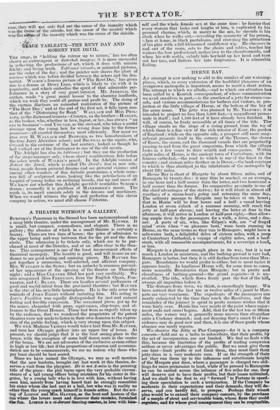HERNE BAY.
AN attempt is now making to add to the number of our watering- places, which, as every extension of the healthilil pleasures of an overgrown metropolis is important, seems to merit a short notice. The attempt to which we allude,—and to which our attention hae been called by a Kentish correspondent, of whose communication. we avail ourselves in part,—is the erection of a jetty for steam-ves- sels, and various accommodations for bathers and visitors, in pro- jection at the little village of Herne, at the bottom of the bay of the same name. The jetty was planned by Mr. TELFORD; it is intended to project no less than 3,000 feet,—a magnificent prome- nade in itself ; and 1,300 feet of it have already been finished. It will, of course, be freely accessible at all times of the tide. The village stands on the slope of a rising ground, from the top of which there is a fine view of the rich interior of Kent, the garden of England ; while on the opposite side, a prospect still more mag- nificent presents itself in the estuary of the Thames, the shores of Essex, the ocean, and the thousand vessels that are perpetually passing to and from the great emporium, from which the village looks in a few years to draw wealth and consequence. Within. eight miles of Herne, is the ancient town of Canterbury, with its famous cathedral,—the road to which is one of the finest in the country ; and sixteen miles further on is Dover,—the land-carriage to which is thus abridged ..to the inhabitants of the metropolis by about fifty miles.
Herne Bay is short of Margate by about fifteen miles, and of Ramsgate by twenty-five : it may thus be reached, on an average, in one hour and a half sooner than the latter, and two hours and a. half sooner than the former. Its comparative proximity is one of the chief advantages of the station; for it will admit in almost all weathers of a steam-boat's going and returning the same day. The ordinary passage to Margate may be taken at six hours; that to Herne will be four hours and a half: a vessel leaving London at seven o'clock of a summer morning, will reach the jetty at half-past eleven; and leaving the latter at four in the afternoon, it will arrive in London at half-past eight,—thus allow• ing ample time to the passengers for a walk, a drive, and a din- ner. A party of six, who, like Gilpin's wife, are " of frugal mind " even when " on pleasure bent," were boats running to Herne, on the same terms as they tun to Ramsgate, might have a. salt-water bath, a delightful drive of sixteen miles, with a peep at Canterbury Cathedral, a voyage of eighty miles, and a beef- steak, with all reasonable accompaniments, for a sovereign a head, or less.
Margate is a pleasant enough place in its way, but it is too much a London in miniature, and the bathing-ground is very bad. Ramsgate is better, but then it is still farther from town than Mar- gate. Broadstairs we would prefer to either, but to most tastes it appears lonely. In loneliness Herne will, for some time to come, more resemble Broadstairs than Margate; but in purity and cleanliness of bathing-ground—the grand requisite—it is un- rivalled. The tide, which flows freely past the foot of the hill, sweeps all impurities before it.
The distance from town, we think, is exceedingly happy. We have noticed that the last ten or twelve miles of a jaunt to Mar- gate are very wearisome. The expedients of the passengers are nearly exhausted by the time they reach the Reculvers, and the remainder of the journey is spent in pretty anxious wishes that it were fairly over. Herne lies very nearly at the point where enjoy- ment ends and ennui begins. Add, that for the last ten or fifteen miles, the watery way is generally more uneven than altogether suits a Cockney stomach; and, not denying that a smart fit of sea- sickness may do good now and then, it is one of those goods whose absence one rarely regrets. We observe the Jetty or Pier Company—for it is a company concern—hold out as a bribe to subscribers, that their profits, by the act of incorporation, are not limited. We find no fault with this, because the limitation of the profits of trading companies seldom or never advantages the public. But we must give theta one hint—limit profits or not limit them, they must limit their jetty-dues to a very moderate sum. If on the strength of their act they run them up to the infamous and extortionate height of the Margate -pier dues, where a passenger is charged two shil- lings for mere permission to land, while if he proceed to Ramsgate he can be carried across the isthmus of five miles for one, they will deserve not to have their profits, but their losses unlimit And we shall be the first to cry "forward" to Fortune in speed- ing their speculation to such a termination. If the Company be moderate in their expectations and their demands, they will de- • serve, and can hardly fail, to proSper. Perhaps their wisest plan would be to extend their company concern, by the purchase of a couple of stout and serviceable boats, whose fares they could regulate, and for whose good management they can be responsible.


























 Previous page
Previous page